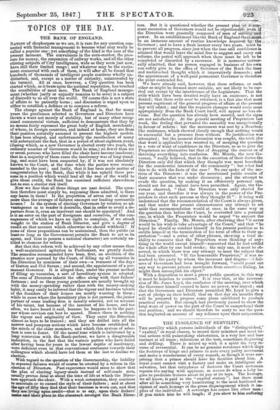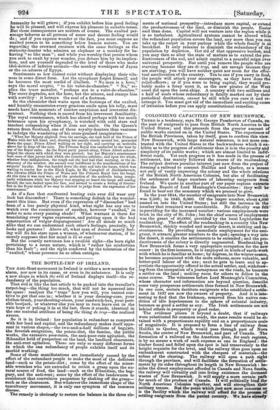THE INSOLENCE OF SERVILITY.
Tux servility which pursues individuals of the "distinguished," "exalted," or royal classes, to record their minutest and most tri- vial actions with painstaking elaboration, is a very low and base instinct at all times; ridiculous at the best, sometimes disgusting and defiling. There is mixed up with it a spirit the very re- verse of reverential. Lt can be no genuine reverence which dogs the footsteps of kings and princes to note every paltry movement and make .a wonderment of every remark, as though it were sur- prising that a prince should have his faculties about him. A royal count cannot visit a factory and make an intelligent ob- servation, but that corypheaus of footmen the Court newsman repeats the saying with applause, as nurses do when a baby be- gins to predicate truisms about its pap or its toys. The homage, we all know, is paid to the " exalted station "; but there must after all be something very humiliating to the most hardened im- plies of such homage in the gross disparagement which it m- plies of the individual. A sovereign has senses like other men : if you (tickle him he will laugh; if you show to him suffering
humanity he will grieve ; if you exhibit before him good feeling he will be pleased, and will express his pleasure in suitable terms. But these consequences are matters of course. The exalted per- sonage behaves as all persons of sense and decent feeling would do ; and if you express wonder at the fact, you must suppose an exalted person to be something below human nature. You are regarding the crowned creature with the same feelings as the curiosity-hunter who admires an elephant or a monkey for be- having "so like man"; and while you worship that person whom you seek to exalt by your wonder, you debase him by its implica- tion, and are yourself degraded to the level of those who make idol-deities of inferior animals—the monkey worshipers of Japan or the ox-adorers of Egypt.
Sentiments so low cannot exist without displaying their vile- ness in some direct form. Let the sycophant forget himself, and he becomes the most sordid of libellers. " No man is a hero," says the moral sceptic, " to his valet-de-chambre." " No," re- plies the truer moralist, " perhaps not to a valet-de-chambre." The sneer degrades, not the hero, but the utterer, and stamps him with servility : it betrays the soul of a footman.
So the chronicler that waits upon the footsteps of the exalted, and humbly enumerates every gracious smile upon his tally, must needs have his moments of sombre scepticism and irreverent dis- content. Nothing then is sacred from his irreverent familiarity. The royal countenance, which has shined perhaps with too much tolerance upon his sycophancy, is watched with cold stare and insolent outspeaking when it does not smile. On the Queen's return from Scotland, one of these royalty-hunters thus ventures to indulge the wanderin of his cross-grained imagination-
" When her Majesty alighted from the carriage, she took hold of the Prince of Wales with her left band, and, drawing her mantle closely around her, proceeded down the quay; Prince Albert walking on her right, and carrying an umbrella above her to keep off the rain. The Princess Royal was conducted to the boat by one of the Royal suite. As the Royal party passed along, Prince Albert acknow- ledged the cheers with which they were greeted; but her Majesty's countenance bore none of that joyous look which she sometimes exhibits; and upon the whole, whether from indisposition, the rough sail she had had that morning, or the in- clemency of the weather, she seemed very indifferent to the manifestations of her subjects loyalty. She was handed down the stair and into the barge, which was waiting to convey her to the Black Eagle, by Mr. Campbell of Auchindarroch, who likewise lifted the Prince of Wales and the Princess Royal into the barge. At this time it was very wet; and the protection of the umbrella being tempo- rarily withdrawn while her Majesty was stepping on board the barge and seating herself, the rain dashed upon her face, and seemed to create a feeling of discom- fort in the Royal mind, if we may be allowed to judge from the expression of her countenance."
As if a face that confronted beating rain ever did wear any look but discomfort ! There is something doltish in the wonder- ment this time. But even if the expression of " discomfort " had been of a less purely physical kind, what right has any one to watch over the countenance of another, however "exalted," in order to note every passing shade? What warrant is there for translating every vague expression, and putting upon it the bad construction of vulgar disparagement ? Are all minds so much
alike that we can understand each other's feelings, precisely, by looks and gestures ? Above all, what man of decent manly feel- ing will fix his stare upon a woman, of whatsoever station, if he merely supposes that her mind is ill at ease ?
But the courtly newsman has a twofold right—the born right • pertaining to a mean nature, which is " rather his misfortune than his fault"; and the right conferred by the toleration of the "exalted," whose presence he so often outrages.



























 Previous page
Previous page